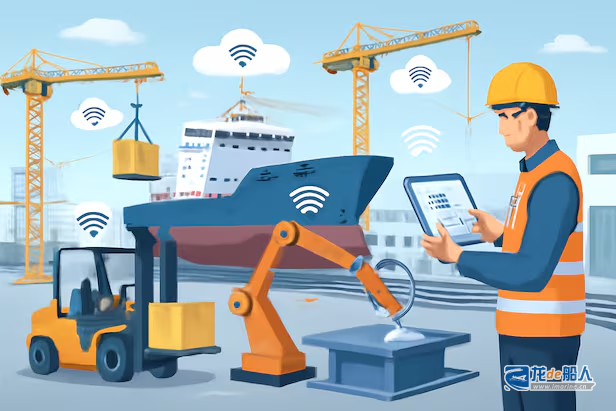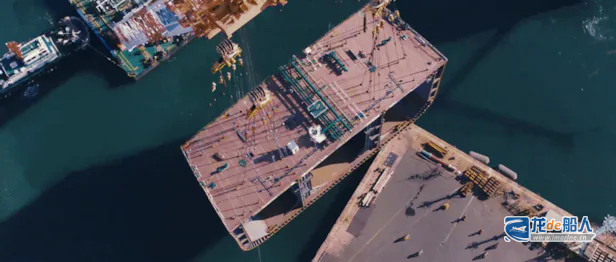South Korean industry is concerned that the smart shipyard proposed by the country’s shipbuilding industry to improve its competitiveness will be abandoned halfway due to the union. In order to apply advanced technologies such as artificial intelligence (AI) and augmented reality (AR), it is necessary to install surveillance at all angles in the shipyard, but the union has expressed opposition.

The Chosun Ilbo reported that over the past few years, the three largest shipbuilders in South Korea, HD Hyundai, Hanwha Ocean, and Samsung Heavy Industries, have been working to build smart shipyards.
With the increasing construction workload of shipyards, as well as in order to solve the long-standing labor shortage problem and improve productivity, it is necessary to build smart shipyards using advanced technologies. However, the installation of surveillance in the workplace is expected to become a new focus of labor disputes.
The core of the smart shipyard is to improve the workflow, with a focus on reducing unnecessary waiting time and redundant tasks by collecting real-time data of the entire shipbuilding process. To do this, “eyes” are needed to observe each part of the workplace. By constantly tracking the location and inventory of large and small sections in the shipyard in real time, it is possible to move efficiently along the optimal path, thereby achieving rapid assembly.
Currently, Korean shipyards have not installed surveillance cameras in the workplace. According to South Korea’s Personal Information Protection Act, the installation of surveillance requires the consent of employees, but the union has opposed this, claiming that companies will abuse cameras as a means of surveillance. The union also believes that automatic scanning cameras used to collect data are a violation of human rights.
In response to objections raised by labor unions, Korean shipyards are collecting shipyard worksite information in other ways. For example, Hanwha Ocean inspects workplaces primarily through drones; HD Hyundai Heavy Industries usually has workers carry personal digital assistants (PDAs) to take and share photos of ship parts and processes; and Samsung Heavy Industries uses real-time inspection sensor systems in automated processes.
The Korean industry believes that it will be easier to establish smart shipyards in the United States. The “bargaining” power of the U.S. labor union is relatively low. For safety reasons, Hanwha Ocean has decided to first install surveillance at the Hanwha Philly shipyard in the U.S., where Hanwha Group completed its acquisition in June 2024. And other shipbuilders considering acquiring local shipyards are reported to have similar plans.
Notably, back in 2024, HD Hyundai Heavy Industries was blamed and complained against by several labor unions for adopting facial recognition to check the access of outsourced workers.
At that time, the union claimed: “HD Hyundai Heavy Industries only excessively collects personal information, including biometric information, from 18,000 internal outsourced workers, and continuously monitors and controls them through cameras, which is a clear discrimination and human rights violation. If outsourced workers do not sign a personal information agreement, it will be difficult to extend their labor contracts, which is a clear violation of the Labor Basic Law, because any changes that are not conducive to employment rules must be approved by the union or the majority of workers in advance.”

Currently, the three major Korean shipbuilding enterprises are accelerating the construction of smart shipyards.
In 2024, Samsung Heavy Industries entered into a partnership with Focus HNS in South Korea, with plans to apply Focus HNS’s intelligent safety management system based on patented AI technology to control and manage various risks that may occur in Samsung Heavy Industries’ shipbuilding process. Samsung Heavy Industries will also try out AI-enabled cameras, detection systems and sensors at various shipbuilding sites through this partnership to make Samsung Heavy Industries Geoje Shipyard a zero-accident safe workplace.
Hanwha Ocean has also announced that it is investing heavily to create the world’s “safest shipyard,” with plans to invest about $48.92 million by 2026 to create a comprehensive safety system that will utilize AI technology to detect all aspects of shipyard risk.
As the largest shipbuilding group in South Korea, HD Hyundai is leading the paradigm shift in the shipbuilding and marine engineering industries by using AI technology for digital innovation. Its subsidiaries HD Hyundai Heavy Industries, HD Hyundai Samho, and HD Hyundai Mipo are promoting the “Future of Shipyard (FOS)” project, which aims to build a future shipyard equipped with cutting-edge digital technologies such as data, virtual reality (VR) and AR, automation, and AI.


